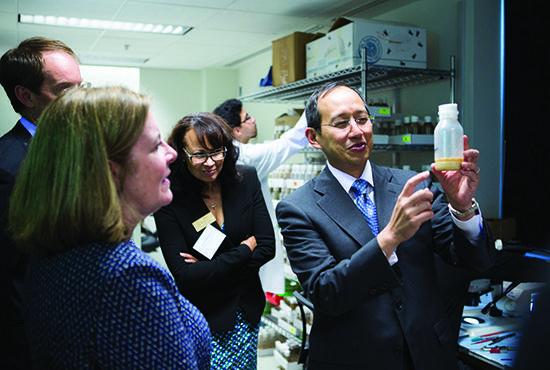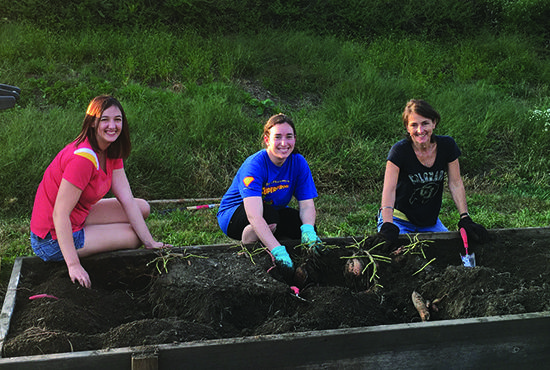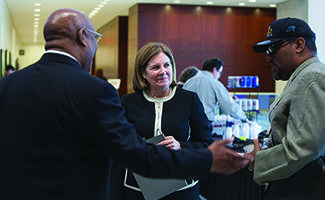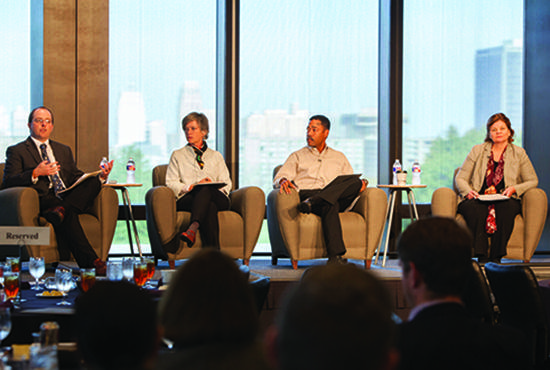Directors gather for Kansas City Fed’s annual joint boards of directors meeting
In September, the Federal Reserve Bank of Kansas City’s Tenth District boards of directors gathered for the annual joint boards of directors meeting in Kansas City, Mo. Though each Kansas City Fed Branch Board of Directors meets regularly within its respective Branch, together one time each year all four offices meet. The purpose of the meeting is for directors to take an in-depth look at the region they represent through community engagement opportunities.
Included in the busy two-day schedule was a tour of the Stowers Institute for Medical Research in Kansas City, Mo. During the tour, directors learned first-hand the significance of this center within the community and on cancer research globally. Stowers President David Chao began his remarks to directors by sharing the story of the founding of the institute, which is primarily the result of the generosity of Jim and Virginia Stowers. Jim Stowers, who founded American Century Investments—also headquartered in Kansas City, Mo.—believed in giving away the bulk of his fortune.
Richard Brown, chairman of the Stowers board, also attended the tour and noted that Stowers’ fortune would have never reached its magnitude without the existence of a strong community bank. Country Club Bank, then led by former Federal Advisory Council member Byron Thompson, loaned Stowers money to begin Twentieth Century Mutual Funds, now American Century Investments. Today, Thompson’s son, Paul, is the president of Country Club Bank and also is a Class A director on the Kansas City Board of Directors.
“This story, involving an entrepreneur and a relationship with a local lender, is a prime example of the value of the community bank model,” said Kansas City Fed Vice President and Board Secretary Krissy Young.
Kansas City Fed President Esther George gave a state-of-the-Bank address highlighting the Bank’s newest initiatives and also commenting on current events surrounding the Federal Reserve System.
“As our founders recognized, the foundation of the Fed’s ability to effectively serve the nation is the relationship between the Federal Reserve Banks and Branches with the citizens and communities of our Districts,” George said. “While much has changed over the intervening years, the need for this direct connection is as critical today as it was then—if not more so.“
Events concluded with a joint meeting where directors heard from Bank leaders about critical topics throughout the Tenth District. The 2017 Joint Boards of Directors meeting will be in April at the Denver Branch.

Employees donate time to support urban garden
Employees at the Federal Reserve Bank of Kansas City take the issues of healthy food and healthy communities seriously. A group of employees supports an urban gardening project in Kansas City, Mo., by using their horticultural skills.
The employees tend 18Broadway garden, an 80-bed urban garden at 18th Street and Broadway Boulevard, near the Kauffman Center for the Performing Arts in downtown Kansas City, Mo. Volunteers from the Kansas City Fed tend eight beds. The land is owned by DST Systems Inc. of Kansas City, Mo., and the project is overseen by the University of Missouri Extension office. The garden’s produce is donated to Harvesters-The Community Food Network to be distributed to those in need.
“We can help the community and those in need by doing something we like to do,” said Larry Green, a Bank employee who leads the volunteer group.
The urban garden is self-sustaining and has special drainage ditches to capture and filter rainwater. A 40,000 gallon tank under the garden holds the water. Two sheds on the
site use solar power to run a generator and water pumps. DST provides maintenance when needed.
Bank employees Lindsey Smith and Sharon Quigley volunteer to work the gardens. This includes planting, watering, weeding and harvesting. Currently, the beds grow collards, Irish potatoes, sweet potatoes, green onion, yellow squash, garlic, carrots and kale.
“I was looking for volunteer work of
this nature,” Smith said. “Harvesting healthy food and giving it to people who need it appeals to me.”
In 2015, 3,000 pounds of food were harvested from the garden. Green hopes the volunteer group at the Bank will continue to grow. He would like to take on additional beds in coming years. Quigley and Smith also hope the project will expand.
“It’s really easy to fit into my regular schedule,” Quigley said. “We go for maybe an hour after work and can often get home at dinner time.”
Learn more about the garden External Linkhere.

Kansas City Fed’s National Community Affairs Conference makes an impact
The 2016 National Community Affairs Conference, “Exploring Financial Resiliency & Mobility,” at the Federal Reserve Bank of Kansas City in September, attracted more than 200 community development professionals from 11 states and the District of Columbia for two days of learning, networking with industry leaders, academics and community development specialists.
The Kansas City Fed offers a national community development conference every other year, and this was the fourth since 2010. It is designed to provide the latest research on key community development issues, along with innovative programs and solutions to build resiliency and mobility in low- and moderate -income (LMI) communities.
“It’s hard to understand some of the financial decisions low-income individuals make,” said Tamicka Bradley with Financial Hope Collaborative at Creighton University in Omaha, Neb. “The keynote on financial decision-making in LMI households really opened my eyes.”
Participants studied statistics, developments and implications on financial health, housing, jobs and other issues impacting financial resiliency and mobility of LMI household and individuals.
Kansas City Fed President Esther George delivered the closing remarks, highlighting the importance of understanding and taking into account the issues impacting LMI communities. She encouraged participants to reach out to the Federal Reserve Bank in their region to see how they might assist in their work to build financial strength and stability in local communities.
Watch a video overview of the conference.

Forum offers insight on employment, economic opportunities for frontline workers
Dozens of professionals and policymakers gathered at the Federal Reserve Bank of Kansas City and in nine different remote locations across the United States to take on labor market shifts and workforce strategies during the “Building Ladders and Raising the Floor: Improving Employment and Economic Opportunities for Frontline Workers” forum in late October.
Kansas City Fed Vice President and Economist Jon Willis moderated the panel discussion. Panelists included Lisa Falcone, director for the Working Bridges Project from United Way of Northwest Vermont; Walter Smith, human resources vice president at QuikTrip; and Adrienne Smith, CEO for the New Mexico Direct Caregivers Coalition.
The panelists discussed government policy changes at the federal, state and local level, including a minimum wage increase, expanding the scope of employees who are eligible for overtime pay and adoption of paid-leave policies. In addition, panelists looked at the roles other stakeholders, such as companies, nonprofits and educators, can play to support economic stability and quality of jobs.
Falcone and Adrienne Smith pointed out the importance of a collaborative effort among these groups, and how “collective impact,” an innovative and structured approach to making collaboration work to tackle deeply entrenched and complex social problems, can be powerful in bringing results.
The panel discussion also tackled the issue of educational attainment for the labor market.
“The notion that all kids need to be pushed to college to succeed needs adjustment,” Willis said. “Forty percent of jobs require college degrees. Those other jobs don’t necessarily require a degree, but they require training, they require a certificate, they require apprenticeships. We need to change our communication to say: ‘These are jobs we need; we value them.’ We should be trying to improve skills as opposed to steering everybody to one segment.’”
The forum was conducted in partnership with the Aspen Institute’s Economic Opportunities Program as part of its Working in America series on the changing nature of work. Find details of the forum External Linkhere.
External LinkLearn more about the Working in America series.

Comments/questions are welcome and should be sent to teneditors@kc.frb.org.
